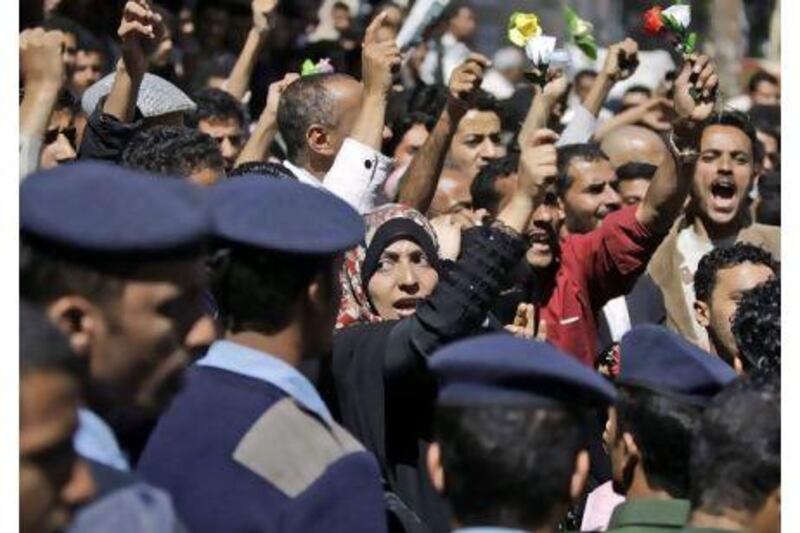SANA'A // If a makeshift tent at the heart of the protest camp in the Yemeni capital makes an unlikely nerve-centre for the massive protest movement threatening to overturn the regime of President Ali Abdullah Saleh, a 32-year-old mother of three inside this ad hoc office is an unexpected leader.
Tawakul Karman, an organiser and activist, gives interviews, writes press statements on a laptop and helps plan the next move in the anti-government campaign.
Mrs Karmen, the daughter of a former government minister, was one of the first activists to organise anti-government protests in Sana'a, and her example has drawn tens of thousands of Yemeni women to the protest movement in this conservative, male-dominated Muslim nation. Mr Saleh's remarks on Friday, condemning the women's involvement as a violation of Sharia law, has only strengthened the resolve of female protesters, such as Mrs Karman, and increased their ranks.
"The president has insulted all Yemeni women and all women. We are here to demand that he apologise for his slander," said Zainab al Samawi while standing in front of the general prosecutor's office on Sunday with a Yemeni flag around her shoulders.
"This man has lost his mind," she added.
The belief that the Saleh's government has lost its legitimacy is evident in cities and towns across the country and, among the hundreds of thousands of protesters, is a growing number of women. The youth-led protest have women on all their organising committees, including security. Although Mrs Karman is the only woman on the 21-member leadership committee, an opposition source told the National she is the considered its leader.
In what analysts describe as a failed attempt to defuse the impact of women in the protest movement, Mr Salah told supporters on Friday, "I call on [protesters] to prevent the mingling of [men and women] that is against Sharia law."
But the president's plea to religious sensitivities in the mostly fundamentalist nation has apparently backfired. The remark launched protests in multiple cities and thousands of women marched on Saturday to the office of Yemen's general prosecutor, Abdullah al Olofi, to file a slander case against Mr Saleh.
"We have presented the general prosecutor a complaint against the president and all the state media that propagated his defaming speech. No Yemeni woman will accept such defamation," said Muna Alhaj, a lawyer and a protest activist.
Adel al Sharjabi, professor of sociology at Sana'a University, believes the active participation of women in the protests was vastly underestimated by the Saleh government and may even signal a shift in Yemen's antiquated gender-politics.
"The active involvement of women in the ongoing revolution is an important shift in Yemen's understanding of the importance of women in society and public life," said Mr al Sharjabi.
"Some groups have been shocked by this dynamic involvement of women in protests, including the regime. The president's remarks is a demonstration of this shock. His intelligence network has launched a campaign against women protesters, trying to appeal to tribal and religious sentiments so people will bring their women back home. However, the response has been too strong and even tribal groups denounced the president's speech," Mr Sharjabi added.
At the forefront of the women's movement is Mrs Karman, who is a member of the opposition Islamist Islah party. When she was arrested when the protests began in January, her detention was broadly condemned and sparked protests in several cities calling for her release.
"There are many women who played an important role from the onset of the protests, but Tawakul is more vocal and radical in her attitude towards the regime. Her main objective and priority is the fall of the regime," said Mohammed Saeed al Sharabi, a protest activist.
Mrs Karman was freed after two days and promptly returned, unbowed, to the protest front.
"I was confident then that our protests would grow bigger and swell to what you see now and that we will win our freedom one day," Mrs Karmen said recently at the protest camp outside Sana'a University.
"It is just a matter of time now and the dictator will go."
Mrs Karman, originally from Taiz province which has been a hotbed of anti-Saleh protests, is an outspoken human rights campaigner and founder of the non-governmental organisation Women Journalists Without Chains. From her tent in the protest camp she regularly gives speeches to the crowd and organises marches, rallies and sit-ins.
"Our own objective is the departure of this regime. I am sure that our country will be better off without this regime that has destroyed everything," she said.
Mrs Karman has consistently criticised Yemen's nearly 40 per cent unemployment rate and its deeply conservative social and religious traditions. Yemen has been criticised by international rights groups over the issue of child brides and gender-based discrimination. Unlike neighbouring Saudi Arabia, however, Yemeni women are allowed to drive cars, vote and hold public office.
Her advice for women is not to wait for permission before demanding rights.
Mr Sharjabi credits the work of Mrs Karman and other civil society activists with an increased awareness of women rights. He believes the women's role in the protest movement could lead to greater equality.
"There is the participation of women in tribal areas like Arman province, which I consider the tribal capital of Yemen. We can also see the Islamist women are actively participating and with the approval of their men," Mr Sharjabi said.
I think this will represent an important shift in the attitudes towards women."
malqadhi@thenational.ae






